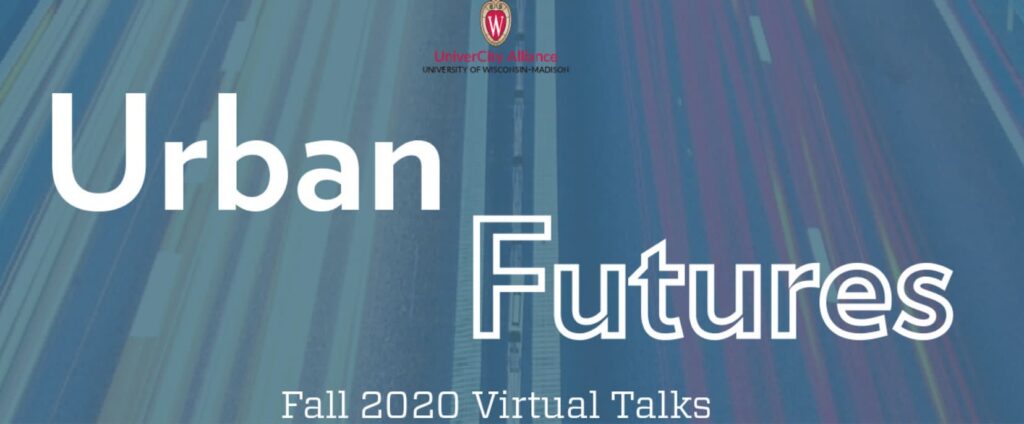The UniverCity Alliance (UCA) is hosting a fall speaker series that brings together researchers, practitioners, students, and community members to share ideas and address issues related to building sustainable and healthy communities. Launched in 2019, the series aims to provide a space for people to connect with each other, learn from one another, and to collaborate on work that will positively impact cities throughout Wisconsin, and beyond.
The speaker series, titled “Urban Futures,” is inspired by UCA’s mission to connect the University of Wisconsin–Madison to local communities by putting university research, education, and services to action. By partnering with different programs across campus, the Urban Futures series features a variety of speakers presenting on a range of topics, including climate change, public health, social justice, poverty, and gender.
But according to Lori Diprete Brown, co-chair of UCA and director of the UW–Madison 4W Initiative, the Urban Futures program is intended to do more than merely educate. By bringing people together from across different fields and disciplines, the series is intended to invoke collaboration and action.
“We wanted [Urban Futures] to be more than a seminar series,” said Diprete Brown. “We’ve always been seeing it as a way to make local to global connections and foster comparative learning … to build community and to build possibilities of working together.”
Diprete Brown said the speaker series is inspired by UCA’s mission to develop a “community of practice,” in which people come together to do shared work and implement positive change. To this end, the Urban Futures series aims to create networking opportunities for people across different disciplines, sectors, and localities. In several cases, these meetings have led to larger collaborative work and community partnerships.
One recent collaboration stemmed from a lecture by Larry Kalkstein, president of Applied Climatologist Inc. and co-founder of the Los Angeles Urban Cooling Collaborative. Kalkstein studies the connection between climate change and health, with a specific focus on cooling technologies that could potentially reduce the intensity of extreme heat events. In October, the Urban Futures program partnered with the Weston Roundtable series to host a discussion with Kalkstein, who shared insight into how cities can improve their responses to excessive heat events.
In addition to the lecture, UCA coordinated a meeting for Kalkstein to meet with members of the Dane County Office of Energy & Climate Change, the Wisconsin Initiative on Climate Change Impacts, and other interested parties from UW–Madison. Now, the collaboration has expanded to the City of Milwaukee, as Kalkstein is scheduled to present his research to a broader group of local policy stakeholders.
Gavin Luter, the managing director of UCA, said that by facilitating these broader conversations and collaborations, the speaker series and the community of practice serve to “reinforce each other” by bridging the gap between researchers and practitioners, which is a core mission of UCA. Additionally, Luter said that Urban Futures helps connect different researchers and programs across campus. Instead of always hosting its own speakers, Urban Futures often partners with existing speaker series across campus to highlight topics related to improving cities and local governments. In doing so, Luter said Urban Futures aims to “lift up” these existing programs, while also facilitating new connections with people across campus.
“The idea is to build a broader network of face-to-face connections on campus,” said Luter. “And then actually start to bring in some of our main partners that we work with at the City of Madison and Dane County.”
And despite the challenges presented by COVID-19, the series has continued to operate successfully. The fall virtual program has seen high turnout for its lectures, and with several more lectures on the horizon, is continuing to inspire new partnerships and opportunities for collaboration.
All in all, the Urban Futures program serves as a testament to the power of the Wisconsin Idea, which signifies a longstanding tradition of the university’s commitment to public service and dedication bettering the lives of Wisconsinites.
“[Urban Futures] is a way to foster a lot of interdisciplinary collaboration that is very community and local government engagement oriented,” said Diprete Brown. “It just goes along with the Wisconsin Idea as well – that we’ve always had this outreach arm where UW would be there for people around the state.”
The Urban Futures fall 2020 program will continue through December 3. You can view the full schedule, as well as access video links to past lectures, on the Urban Futures webpage.
